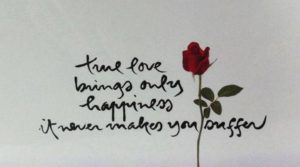By Monastic Sister Hien Nghiem (Sister True Dedication)
The deep friendship of brotherhood and sisterhood in the Sangha is one of the greatest gifts of being on this path. We shouldn’t be afraid to love each other, to take care of each other, and to go deep. As the Buddha once said, “Spiritual friendship is not half the spiritual life; it’s the entire spiritual life.”
If we start dating someone in the Sangha, we need to be aware that we’re taking a risk. If the relationship crashes and burns, we risk losing everything we have together, including our spiritual friendship.
If you’re thinking about dating someone in the Sangha, it’s a good idea to ask other Sangha friends what they think and listen to their advice.
We can go a long way in getting close to each other and understanding each other without going too far. As the monastics can tell you, spiritual friendship can be very deep without a physically intimate dimension. So if you’re thinking about dating someone else in the Sangha, it’s always a good idea to ask other Sangha friends what they think and listen to their advice.
Take It Slowly
Our society has created an energy of rushing inside us and around us. We’re terrified of not meeting the love of our life so we want to maximize the possibilities, to date as many people as possible, and to rule out someone quickly. This fear, this energy of running, is something we need to sit with in our meditation, to recognize it, acknowledge it, and look deeply into it so we can let it go.
Combining the energy of mindfulness with the culture of eager dating is a potent mix. Mindfulness makes us more sensitive, caring, confident, trusting, and open. So when we date, our heart will go deep more quickly. We’re more vulnerable. We need to remember that the Third Mindfulness Training is there to protect us and protect the other person.
If the other person is truly the love of your life, you will know it, and there’ll be no need to rush. Everything already is already as it should be, and the relationship will evolve naturally and beautifully with some good compost along the way 🙂
Cultivate Reverence and Trust
In recent years, Thay added “trust” and “reverence” to the traditional four elements of true love (compassion, loving kindness, joy, and inclusiveness). With dating apps and the culture of speed, competition, jealousy and craving around dating, it’s easy to lose sight of our own sacredness and the sacredness of the other person.
When we date in the Sangha, we need to cultivate trust and reverence. We need to respect each other, and be someone that others can trust. Please don’t be reckless with your body and emotions, or with the body and emotions of someone else. They are sacred, and your relationship as spiritual friends is the most precious thing you have. It’s far more precious than the dating relationship itself.
When you flirt, know that you are flirting, and know the risks you are taking.
Dating and flirting can be fun and bring us lightness and joy. We feel young and alive and happy. But we should be aware of the not-so-positive energies of craving and consuming that can also come up. When you date someone, don’t consume the other person – don’t eat each other up! Respect the mystery and sovereignty of each other. See clearly what you are doing. When you flirt, know that you are flirting, and know the risks you are taking. We know that a relationship that turns sour can cost our friendship and damage the Sangha. Don’t risk anything lightly. Don’t let things happen by accident. We need to take responsibility for our actions and the direction we are pushing things in, mindful of the fact that one of us (or both of us) might get hurt.
If you’ve dated one person in the Sangha, but it hasn’t worked out, it’s very important to be respectful of their needs before starting to date someone else in the same Sangha. If the first person is not ready for us to date someone else, we need to respect that. There is no rush. We need to be careful not to water seeds of jealousy, insecurity and disharmony in the Sangha with our actions. Our priority should be the collective atmosphere of the Sangha, and the wellbeing of our friends as fellow-practitioners.
Breakup and Betrayal in the Sangha
If you’ve got hurt or feel betrayed after dating another person in your Sangha, there may be a strong desire to close the door of your heart and give up on your Sangha or your practice. But it is possible to learn from Thay’s example and find a way to practice to keep our heart open, no matter how much we are hurt. You may have read his poem (now also a song):
My joy’s like spring, so warm.
It makes flowers bloom all over the Earth.
My pain’s like a river of tears, so vast it fills the four oceans.
Please call me by my true names,
So I can hear all my cries and laughter at once.
So I can see that my joy and pain are one.
Please call me by my true names, so I can wake up
and the door of my heart can be left open.
As a practitioner, we owe it to ourselves to never give up on loving. It is possible to keep the door of our heart open. It is possible to forgive, to heal, and to become more compassionate towards ourselves and others.
Being hurt is a chance to grow and transform. Try not to blame. Try to understand.
Keep Communication Open
When we are hurt, we naturally want to close up and disappear. But being hurt is also a chance to grow and transform. Try not to blame. Try to understand.
Mindfulness practice and other Sangha friends can give us the courage and stability we need to calm our strong emotions and to keep communication open with the other person. When communication is open, we have a chance to to understand what we did right and what we did wrong, and to see our habit energies more clearly.
As soon as you start dating in the Sangha, interbeing comes into force. You are no longer a separate self. You are two practitioners, and you are co-responsible for each other and continuation on this spiritual path. You cannot abandon the other one. If the person we dated gets hurt, we have to reach out to them and support them spiritually afterwards so they feel comfortable to continue coming to the Sangha. If they need more from us, like more communication, more understanding, and more listening, we have to be available for that. We can’t say “No, I have moved on. You have to move on.” We have to invest in our Sangha relationships, and put out time and energy to help them.
As soon as you start dating in the Sangha, interbeing comes into force.
If we are the one who got hurt, we need to find a way to use kind and skilful speech to let the other person know so they have a chance to see the consequences of their actions and apologize. We need to practice the mantra, “I am suffering, please help.” But we should also take responsibility for our hurting. We shouldn’t blame the other person too much or ask too much of them. We shouldn’t hold them hostage to our suffering. We should be careful to avoid becoming a victim. With the practice, everything is possible. We have the power to free ourselves from our hurt.
Keep the Practice Alive
We need to remember that we, ourselves, are responsible for our own happiness – not the other person. Everything is mud for our lotus.
We need to keep our practice alive right in the mud of a relationship. Remember all the steps of embracing suffering with the energy of mindfulness:
Step 1
Don’t pretend that it doesn’t hurt if it does hurt – we need to practice “recognising suffering.” Ask yourself, “How am I feeling? What is hurting?” Try to name the pain more clearly: is it disappointment, is it sadness, is it anger, is it shame?
Step 2
We need to embrace the suffering. Embrace your inner child with tenderness and care. Allow the suffering to be there in your awareness. Keep showing up to Sangha and allow the collective energy to embrace your pain. Don’t run away. Follow your breathing and stay with the Sangha. Your hurt, anger, or sense of betrayal are all impermanent, and can be embraced and transformed. It is our mindfulness practice that can help us be resilient, be brave, and transcend our limits. Use the energy of mindfulness to give yourself the strength, courage, and stability to stay in a Sangha session or outing where that person who hurt you is present. At the same time we must practice self-care, self-compassion, and protect ourselves.
Step 3
Don’t let the second arrow hit. Don’t exaggerate or make it out to be worse than it is. Be real, be authentic, and be honest with yourself. Stay cool.
Step 4
Take time to look deeply into your suffering and ask yourself: Why does it hurt so much? Do I have any wrong perceptions? Or unrealistic expectations?
We can also ask ourselves, “What am I waiting for? Why aren’t I happy in this moment?” We may be expecting something from the other person – like an apology or an acknowledgement that what we had was great while it lasted. But, for whatever reason, they may not be able to give it. We don’t need to wait for them to do or say something in order to touch happiness again. We have to seek out the conditions of happiness that are around us already. And we have to seek out the conditions for happiness that are inside us. Perhaps we are seeking love and affection and approval from the other person when we really need to offer it to ourselves.
If we can get over a dating disaster in our Sangha, we get to understand ourselves more clearly, and we get to transform some habits we’ve been wanting to transform all along. These might be the habits of being over-sensitive, or craving intimacy, or seeking approval, or reassurance, and so on. Freeing ourselves from these habits, we become the kind of person we would like to be. We become more truly ourselves.
Facilitators and Dating
As a facilitator, we have a special responsibility in the Sangha, and a higher standard of moral conduct is expected of us. It may be difficult to hear this. It’s hard enough to find facilitators anyway, and if a monastic comes along and says something like this, it may make it even harder!
“I never wanted to facilitate anyway, they pushed me to do it!” is what we all say, and it’s true: our Sangha has trust in us and asked us to do it. It’s part of our spiritual path and growth. At the same time, when we’ve facilitated well, we feel nourished and we know we have nourished others. We grow thanks to the experience of facilitating.
The key point is that after a good session, we shouldn’t think that it was “us” that did it. We don’t get proud; we just feel grateful to the teachings and to our teachers, and we feel happy to have been of service, realising our aspiration to bring more love and understanding into the world. Sometimes in the monastery, after leading a good session, the monks and nuns go to touch the earth at the ancestors’ altar to offer the merit up and away. We don’t keep anything for ourselves. We don’t think that we are a separate self who did it.
As a facilitator, we do have a special responsibility. Our friends in the Sangha put their trust in us in that moment. Newcomers to the Sangha see us embodying the teachings, practices and collective Sangha energy, and they may find it hard to distinguish between what is “us” and what is the energy of practice itself. Each one of us brings our own flavor to the practice, but it’s easy for people to confuse the appeal of the energy of mindfulness, concentration and compassion with being attracted to that facilitator as an individual. This is also a challenge for monastics. Maybe people sometimes get attracted to monks and nuns because the energy of compassion and mindfulness itself is very attractive. We are all thirsty for more love and understanding.
As facilitators, we need to be extra careful if we date someone in the Sangha.
As a facilitator, or elder brother or sister in the Sangha, we have to be aware of this. We have to be someone whom the Sangha can trust. We need to follow the Third Mindfulness Training, and be extra careful if we date someone in the Sangha. Facilitators can help each other in the spirit of brotherhood and sisterhood by giving each other feedback. There may be things that others see, that we cannot see ourselves.
Take Refuge in the Sangha Eye
When dating in the Sangha goes wrong, that’s exactly when we need to be able to take refuge in the Sangha. We shouldn’t run away. We need to know how to ask for support and listening from our spiritual friends, but without making a drama out of things and without creating more division.
Compassion and deep listening are not just ideals. It’s a concrete practice we offer each other in difficult moments. We ask our friends to listen compassionately to us, to help us embrace our pain, and to give us advice. They may see things differently, or they may have another perspective to offer. They might say, “I think you need to transform this habit energy.” Or they might say, “Hey, you need to let go of this now.” We have to listen to them. And if they say, “Hey, it’s not so bad after all. It’s not a big deal,” we need to listen to that, too. We have to respect their advice and practice with it, and not let a failed dating situation in the Sangha become a mess for everyone.
We also have to respect our friends’ limits and not ask them to listen beyond their capacity. In fact, it may be that we are the ones who need to listen more to ourselves, deep inside.
When dating in the Sangha goes wrong, we need to know how to ask for support and listening from our spiritual friends, but without making a drama out of things.
Protecting the Sangha
The harmony of the Sangha and our shared aspiration of creating a happy, harmonious environment of practice has to take priority. The Sangha session is a refuge for everyone. Each of us has our own challenges and difficulties, and the Sangha is a neutral space to generate the energy of mindfulness and peace for everyone’s healing and nourishment. So we shouldn’t drain the Sangha’s energy too much with our relationship woes.
But if there is tension between Sangha members or if there’s an elephant in the room because of a dating situation or relationship break-up, we can’t say the Sangha has nothing to do with it. The Sangha is being affected. Sometimes we can take care of the painful feelings indirectly simply by having a good, harmonious practice session. We allow the situation to be embraced by the collective energy. Or, if the situation is creating disharmony that is affecting the practice, then we do need to bring it out. If we’re involved, when the time is right, we can find a moment to say to the whole Sangha, “Dear friends, I’m sorry this happened. This is how I am practicing with it and these are the challenges that are still there for me.”
We mustn’t let a failed relationship become a block of ice in the Sangha dynamic that affects the collective energy. But when we share about it, we do so skilfully. We stay discreet. That is the way to respect ourselves to respect the other person. We reach out to other Sangha members for their insights, and we know they will offer them with compassion and understanding, and we will be able to overcome the situation together.
For further reading:
“Fidelity: How to Create a Loving Relationship that lasts” by Thich Nhat Hanh
“Teachings on Love: How Mindfulness Can Enhance Your Intimate Relationships” by Thich Nhat Hanh
“Cultivating the Mind of Love” by Thich Nhat Hanh
“True Love: A Practice for Awakening Your Heart” by Thich Nhat Hanh
“How to Love” by Thich Nhat Hanh
“Love’s Garden: A Guide to Mindful Relationships” by Peggy Rowe-Ward and Larry Ward



















This is a really well-written insightful article about relationships. And it seems relevant to people of all ages who might be exploring dating or partner/rimantic relationship seeking. Excellent. Thank you so much.
Thank you for taking the time to read this article. I appreciate that it’s pretty unusual for a monastic to share about dating. Maybe I’ve been a bit provocative! Please feel free to use this thread to discuss or question anything I’ve written. Loving you all, sister true dedication
Bravo! Wonderful article! You have collected all our experiences. Thank you for writing this for us.
Jenny
Very useful article. Will it be translated in French? Thank you so much!
This was very beautifully written, and there is much to reflect on. Thank you sister for the practical applications 🙂
“If we are the one who got hurt, we need to find a way to use kind and skilful speech to let the other person know so they have a chance to see the consequences of their actions and apologize. We need to practice the mantra, “I am suffering, please help.”
What if the other person has no capacity to listen deeply?
What if the other person said, “No, I refuse to help you.”
Is it possible to keep relationship with the other person? (Even if you forgive the other person, that person may not change the mind. In the extreme case, that person may abandon you. Then communication will be cut.)
What if the other person is your wife (husband)?
What if the other person is the moderator of Sangha?
What if the moderator of Sangha ignore you or abondon you from the Sangha? (The mental disposition of the moderator of Sangha is not always mature and is not always the highest in the Sangha.)
All above actually happened and are real story (non-fiction).
Big questions! If the other person is not able to help you, it is because they are still hurting. They need more time, more compassion, more understanding. We haven’t understood the ways in which they are hurting yet, we haven’t helped them out the thorn in their heart, so of course they cannot help us with the thorn in ours.
In a long-term partnership, we commit to one another, knowing we will change, knowing we will face challenges. We are gardeners of each other. It’s our responsibility, as romantic partners, to “water the flowers” in our beloved’s garden: to identify their talents, their qualities, their beautiful actions, and let them know (speak it out). It’s also our job to take care of their compost, to help transform it into beautiful flowers. We know we have compost too, and as a practitioner, we are also taking care of our own compost. Maybe the other person needs our help. When we first fell in love, isn’t that what we promised them? We promised to love all of them, unconditionally. And so how come we find ourselves in the current situation? Because we have neglected our garden. We need to come home and take care of our shared garden, with patience, forgiveness, freshness, just like the day we first fell in love.
In the case of a facilitator, this is a relationship on our path of practice. There is nothing we cannot transform ourselves – our irritation, our need for attention, praise, approval, acceptance. We are not a victim. We have the power to offer all these things to ourselves. What is the role of a facilitator? To create a safe space of practice. They do not “owe” us anything, except gentle reminders from time to time, that we may or may not receive. On our path of practice we need to be ready to identify all our habit energies, including the less beautiful ones. Our enthusiasm, our eagerness, our determination, are all wonderful qualities. But there may be a need for space, mutual respect, tolerance, and inclusiveness in the sangha. We’re just there to be human together, naturally. We try not to ask too much of each other. Just being present for each other, generating the energy of mindfulness is already wonderful.
Dear Sister True Dedication thank you so much for these beautiful words so full of wisdom and compassion!
This is a very deep Dharma teaching…i feel a lot of gratitude!thank you!
Dear Sister Hien Nghiem,
Thank you for this profound and concrete sharing. After reading this I have a few questions concerning our Sangha but I don’t feel quite comfortable to publicly ask them here. Is it possible if I write you a personal email instead? Thank you.
Sending you love and gratitude,
Thao
Yes dear Thao, please feel free to email me 🙂
(you can send a message via the website contact form: http://wkup.org/contact/)
This is helpful. Thank you for sharing your wisdom, Sister.
Thank you Sister Natasha!!
You have bloomed so beautifully in the practice. I would also recommend “Learning True Love” by Sister Chan Khong.
Gosh, I wish I had read this post many years ago. It would have helped me deal with a lot of heartache in my past relationships. There are so many beautiful insights in this article. I will start putting these practices in place right away with my romantic and non-romantic relationships!